The Health bulletin [serial] - University of North Carolina at Chapel Hill
The Health bulletin [serial] - University of North Carolina at Chapel Hill
The Health bulletin [serial] - University of North Carolina at Chapel Hill
- No tags were found...
Create successful ePaper yourself
Turn your PDF publications into a flip-book with our unique Google optimized e-Paper software.
August, 1951 <strong>The</strong> <strong>Health</strong> Bulletin 11the most <strong>of</strong> its l<strong>at</strong>ent preventive facilities,the importance <strong>of</strong> preventive medicinemust be re-emphasized. Every onein the field <strong>of</strong> medicine and publichealth should make it his business toknow wh<strong>at</strong> needs to be done to preventdisease in this country and, regardless <strong>of</strong>his primary specialty, he should workunselfishly for the accomplishment <strong>of</strong>this objective. If all our 200,000 Americanphysicians will apply the principles<strong>of</strong> preventive medicine to the families<strong>of</strong> their p<strong>at</strong>ients and give enthusiasticsupport to their community health programs;if all <strong>of</strong> the coimtry's hospitalswill accept the added responsibility <strong>of</strong>serving as real health centers for theircommunities with a view to keeping thepeople well; and if sufficient healthagencies manned by adequ<strong>at</strong>e numbers<strong>of</strong> competent specialists are provided forthe entire country, the physical, mentaland moral fiber <strong>of</strong> the n<strong>at</strong>ion can beenormously strengthened.This is not a Utopian dream, but toaccomplish it quickly is a task whichwill require many revolutionary changes.One basic need is for a thorough revamping<strong>of</strong> the curriculums <strong>of</strong> the 79medical schools in order to give themedical gradu<strong>at</strong>e a better concept <strong>of</strong>the practical importance <strong>of</strong> preventivemedicine and public health. He shouldbe indoctrin<strong>at</strong>ed with the preventive<strong>at</strong>titude. This will help to prepare himfor his wartime responsibilities eitherin civil defense or in the Armed Forces,It should also assist in recruiting thehealth specialists now urgently neededto man our <strong>of</strong>lBcial and non<strong>of</strong>ficialcivilian health agencies and for thepreventive medicine organiz<strong>at</strong>ions <strong>of</strong>the Army, Navy, and Air Force. By thesame token, the military physician andsurgeon should recognize his responsibilityfor preventive medicine in theArmed Forces. <strong>The</strong> strengthening <strong>of</strong>the civilian health program for theemergency will require the provision <strong>of</strong>additional local health units to coverthe entire country and the taking <strong>of</strong>action to correct the present shortagein health specialists needed in the totalcivilian health program.More <strong>Health</strong> Specialists Required forthe Defense Program.—<strong>The</strong> development<strong>of</strong> the emergency health program forthe Armed Forces will requu'e carefulplanning geared to meet the peculiarcircumstances <strong>of</strong> the present thre<strong>at</strong>against us. <strong>The</strong> Army, Navy, and AirForce must develop and implementsound mobiliz<strong>at</strong>ion plans for the rapidexpansion <strong>of</strong> their programs <strong>of</strong> preventivemedicine along lines which will enablethem to carry forward all the advancesnow <strong>at</strong> our disposal. Each <strong>of</strong> theArmed Forces Medical Services now hasa good peacetime division <strong>of</strong> preventivemedicine; therefore, they are in astr<strong>at</strong>egic position to prepare for war,but to expand the present programssufficiently to meet the additional requirements(1) <strong>of</strong> our forces now fightingin Korea, (2) for the n<strong>at</strong>ionalmobiliz<strong>at</strong>ion and training activities nowtmder way, and (3) for the still gre<strong>at</strong>erneeds <strong>of</strong> another possible global warwill call for large numbers <strong>of</strong> expertstrained in every aspect <strong>of</strong> public health.Certain parts <strong>of</strong> this training can beprovided within the respective services;but large numbers <strong>of</strong> the <strong>of</strong>ficers neededfor key positions will require postgradu<strong>at</strong>etraining <strong>of</strong> the type now availableonly in the country's 10 accreditedpostgradu<strong>at</strong>e schools <strong>of</strong> public health. Itrequires time to carry out such training,and therefore each <strong>of</strong> the servicesshould rapidly develop adequ<strong>at</strong>e pools<strong>of</strong> specialists to meet their entire needs.During the last war both military andcivil health were handicapped becaviseit was necessary for the Armed Forcesto draw such personnel largely fromthe inadequ<strong>at</strong>e group <strong>of</strong> trained specialistsrequired by the civil popul<strong>at</strong>ion.This weakened to a dangerous degreethe staffs <strong>of</strong> civilian health agencies andthe faculties <strong>of</strong> schools <strong>of</strong> medicine,dentistry, and public health. In the presentemergency, this mistake must notbe repe<strong>at</strong>ed, for to do so would be likedestroying the goose th<strong>at</strong> laid thegolden egg. Large numbers <strong>of</strong> healthspecialists must therefore be recruitedand mobilized; and this supply must bemaintained in order to oper<strong>at</strong>e the n<strong>at</strong>ion'swartime military and civilianhealth programs. <strong>The</strong>se specialists will


![The Health bulletin [serial] - University of North Carolina at Chapel Hill](https://img.yumpu.com/47242858/157/500x640/the-health-bulletin-serial-university-of-north-carolina-at-chapel-hill.jpg)
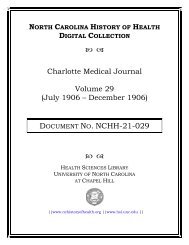
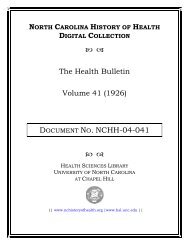
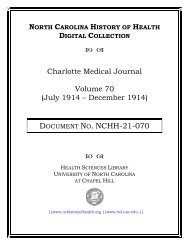
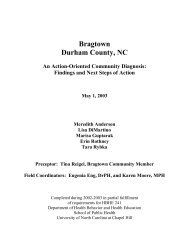
![Bulletin of the North Carolina Board of Health [serial] - University of ...](https://img.yumpu.com/48032016/1/153x260/bulletin-of-the-north-carolina-board-of-health-serial-university-of-.jpg?quality=85)
![The Health bulletin [serial] - University of North Carolina at Chapel Hill](https://img.yumpu.com/47603625/1/169x260/the-health-bulletin-serial-university-of-north-carolina-at-chapel-hill.jpg?quality=85)
![The Health bulletin [serial] - University of North Carolina at Chapel Hill](https://img.yumpu.com/43204263/1/172x260/the-health-bulletin-serial-university-of-north-carolina-at-chapel-hill.jpg?quality=85)
![The Health bulletin [serial] - University of North Carolina at Chapel Hill](https://img.yumpu.com/41981074/1/163x260/the-health-bulletin-serial-university-of-north-carolina-at-chapel-hill.jpg?quality=85)
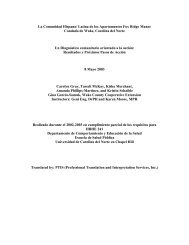
![The Health bulletin [serial] - University of North Carolina at Chapel Hill](https://img.yumpu.com/40912928/1/164x260/the-health-bulletin-serial-university-of-north-carolina-at-chapel-hill.jpg?quality=85)
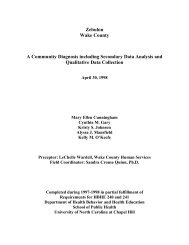
![The Health bulletin [serial] - University of North Carolina at Chapel Hill](https://img.yumpu.com/35643061/1/167x260/the-health-bulletin-serial-university-of-north-carolina-at-chapel-hill.jpg?quality=85)
![Biennial report of the North Carolina State Board of Health [serial]](https://img.yumpu.com/34024350/1/166x260/biennial-report-of-the-north-carolina-state-board-of-health-serial.jpg?quality=85)
